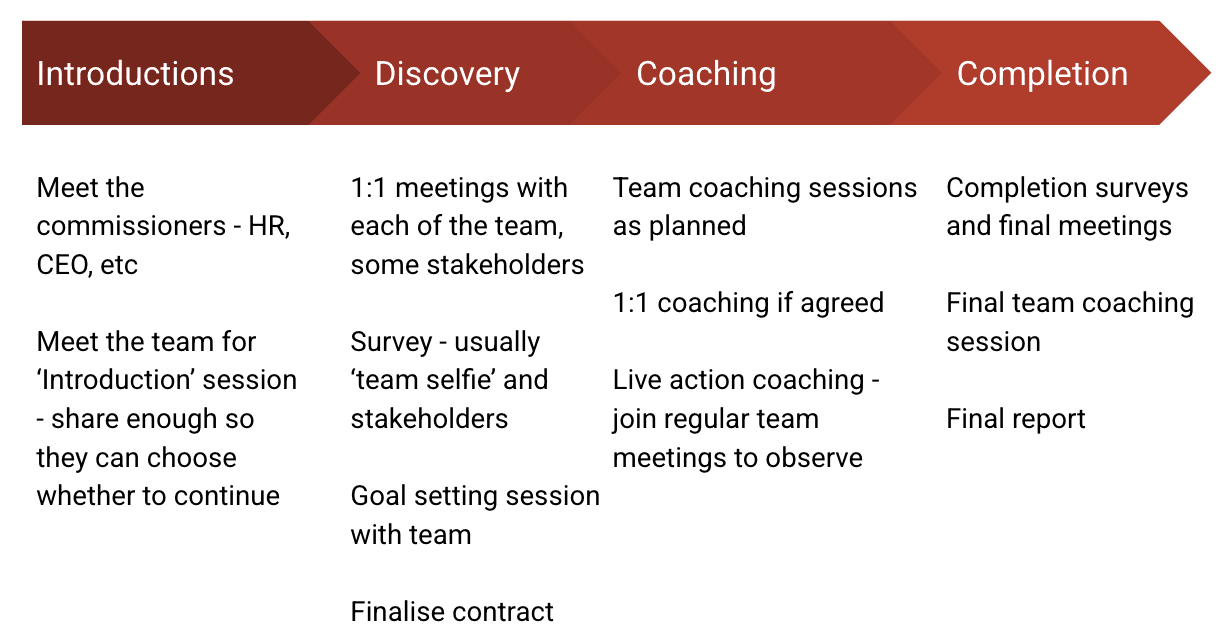Team Coaching
Team coaching helps teams have the conversations they need, in the way they need.
We've all been in teams that just aren't working well.
Maybe a couple of people are at constant loggerheads - or all of them are bickering. Maybe there's someone who drags things down with negative commentary - or slows it down with too much detail. Maybe everyone's lovely but nothing's getting done - or maybe there's a lot of angry cross-currents, and everyone comes away from each meeting feeling dissatisfied. Maybe the CEO's frustrated at what the team's doing - or maybe the team's frustrated with the CEO.
Overview
Team coaching is a different approach to helping teams work at their best.
It's not about facilitation - I don't set up and run the meetings, or timekeep for a strict agenda
It's not about training - no workshops or wholly predefined curriculum to work through
It's not about consulting - I'm not there to give advice, diagnose or research
It's a coaching approach - so I ask questions more than provide answers.
It's an emergent approach. I'll provide enough structure to get us moving, but what needs to be discussed is often what folks haven't really articulated yet, but emerges during the discussion.
It is about going deeper; slowing down to speed up. Those annoying things that the team aren't talking about, are what's blocking them.
It is about fluffy stuff - emotions; behaviors; beliefs; the irrational side of us humans. These have huge impact on the hard stuff - how we work together; how we get stuff done.
So - it's about dynamics more than process, and process more than content.
Who's it for?
While team coaching can be helpful for any team that would like to improve its ways of working, it has particular impact for teams that know they have problems - that they're not working together well.
In particular, the impact of issues in senior management teams are ones which reverberate throughout the whole company - and are harder to fix.
So, typically, team coaching is brought in for:
Senior leadership teams (SLTs) - including the team leader (CEO)
They may be in clear conflict - often after an acquisition, merger or similar big change.
Many of them are aware that they're not performing well as a team ("our meetings are a waste of time")
There's often a scapegoat or two ("I don't know why Y is on the team")
There might be existential issues - as in: the company will go under unless the SLT pull together
What will you get from it?
A management team with:
better relationships, enabling better contribution.
better communication, enabling better decisions.
better accountability, enabling better output
IE: fluffy stuff, that has direct impact on your bottom line.
It's not about ending every meeting with a group hug. But: mutual respect; healthy patterns of communication; and an autonomous approach to keep improving and holding each other accountable - will give a huge boost to how and what the team deliver.
Practicalities
A typical team coaching engagement is 4 to 8 sessions of 2-4 hours each, over the course of about a year. We'll agree goals at the start with the team, and report on how it went
There are some extra meetings and surveys at the start - the 'Introduction' session enables the team to meet me, find out more about this, highlight what areas would be useful to survey as input; and confirm they're willing to proceed.
Then, during 'Discovery', I meet each of the team and several stakeholders, and run the surveys - all to gather input around what changes people want. These are played back to the team and discussed in the 'goal setting' session.
The 'Coaching' is the bulk of the work, of course - usually over about a year. As well as the 'team coaching' sessions, I usually also join the team for a couple of 'live action' coaching sessions over the course of the year - the team run a meeting as normal while I observe the dynamics and process, and play back to them what I notice. You may also choose to do 1:1 coaching for all of the team along the way.
At the end of the period, I gather insights from the team and their stakeholders on what's changed, and write up a final report on the impact of the team coaching - there is often some quantitative data around ROI, but the important changes are usually qualitative - the 'VOI', the value that can't be easily measured financially.
"Not all things that count, can be counted. Not all things that can be counted, count."

Let’s chat
You don’t need to have it all figured out. That’s what coaching is for. Book a free, no-pressure 30 minute chat to see if we’re the right fit.

